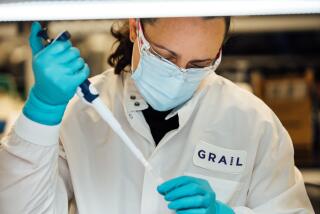Firm Told to Warn 350 With Heart Valves
- Share via
Federal health officials have ordered an Irvine subsidiary of Pfizer Inc. to give special notification to about 350 mechanical heart-valve recipients worldwide who may have been implanted with the potentially defective devices, the company disclosed Monday.
Under pressure from lawsuits and the Food and Drug Administration, Shiley Inc., the Irvine firm that manufactured the valves, began a program in December, 1990, to directly notify valve recipients of potentially life-threatening failures of the devices. But a recent letter from the FDA directs Shiley to give priority notice to people who received valves manufactured between February, 1981, and May, 1982.
The company estimates that 350 people may be surviving from among the 520 who received a particular group of valves manufactured during that period. Of those, 130 are believed to live in the United States.
The FDA, in its letter dated last Friday, disclosed that a single employee may have been involved in the processing of the particular group of valves. The employee is not identified by name, but only as “employee 2832”
“Cracked valves purportedly welded or rewelded by employee 2832 in fact were not so processed, but were apparently polished or otherwise cosmetically finished, thus resulting in valves with patent defects more likely to cause heart valve fractures,” the letter states.
Robert Fauteux, a Shiley spokesman, said Monday that the company discovered last year that the employee number was associated with the group of valves. But a company investigation found that even though the number 2832 appears in production records, it was never issued to an employee. The company has not been able to determine how or why the number was used on the records.
About 82,000 people worldwide were implanted with the valves. As of January, 313 ruptures of the Bjork-Shiley valve had been reported to the FDA, resulting in 204 deaths. Shiley, which voluntarily stopped making the valves in 1986, argues that the threat of failure is slim and the risks of replacing the valve--without an actual fracture--are too great to undertake.
Shiley said it does not believe that patients who received the special group of valves are at greater risk of a rupture than other valve recipients. But the FDA said the group of valves has a fracture rate about twice as great--0.6% per year--than the other valves.
More to Read
Inside the business of entertainment
The Wide Shot brings you news, analysis and insights on everything from streaming wars to production — and what it all means for the future.
You may occasionally receive promotional content from the Los Angeles Times.









